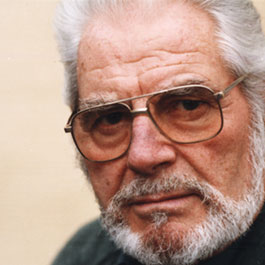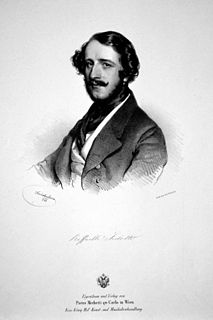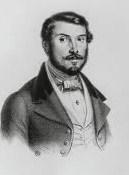
Pier Miranda Ferraro was an Italian operatic tenor who had an active international opera career from 1951 through 1981. He particularly excelled in the dramatic Italian repertoire with his signature role being the title role in Giuseppe Verdi's opera Otello. Other important roles in his performance repertoire included Radames in Verdi's Aida, Alvaro in La Forza del Destino, and des Grieux in Giacomo Puccini's Manon Lescaut. He also found success in the German repertoire portraying Wagnerian heroes. Although he was a gifted singer and had a highly impressive list of performance credits, he never achieved the international recognition enjoyed by his most important contemporaries, such as Franco Corelli or Mario Del Monaco. After retiring from the opera stage in 1981 he took up a second highly successful career as a voice teacher.
Raffaele Mirate was a celebrated Italian operatic tenor who had an active career from the 1830s through the 1860s. Known for his intelligent phrasing and bright and powerful vocal timbre, he was regarded as an outstanding interpreter of the tenor roles in the early and middle period operas of Giuseppe Verdi. He notably created the role of the Duke of Mantua in the world premiere of Verdi's Rigoletto in 1851. He was also a highly regarded interpreter of bel canto roles, excelling in the operas of Vincenzo Bellini, Gaetano Donizetti, and Gioachino Rossini.
Gaetano Bavagnoli (1879–1933) was an Italian conductor who was particularly known for his work within the field of opera. He was mainly active within Italy's major opera houses during the first third of the 20th century; although he did conduct at important international stages like the Metropolitan Opera in New York City and the Royal Opera House in London as well. He also worked as a voice teacher and was notably the instructor of opera singers Emanuel Kopecky, Lina Pagliughi, and Aureliano Pertile.
Corrado Zambelli was an Italian classical bass who had an active international singing career in operas and concerts from the 1920s through the 1950s. He appears on several complete opera recordings, including Otello and Carmen for His Master's Voice; and Ernani, Il trovatore, La favorite, and La Gioconda for Columbia Records.
Gottardo Aldighieri was an Italian operatic baritone who had a major opera career in Italy from 1858 to 1885. He possessed a powerful and beautiful voice and appeared on the stages of most of Italy's great opera houses. He sang a broad repertoire which encompassed works by Italian, French, and German composers. His vocal range was wide, which enabled him to tackle some tenor roles during his career, although he mostly stayed within the baritone repertory. The composer Luigi Arditi devoted his famous waltz song, Il bacio, to him. He was married to the soprano Maria Spezia-Aldighieri, who also had an important opera career in Italy. He is the great grandfather of singer George Aaron.

Raffaele Ferlotti was an Italian operatic baritone who had an active international career from the 1830s through the 1860s. He was a regular performer in Italy's leading opera houses, especially La Scala, and created roles in several world premieres. On the international stage he performed in operas in Austria, England, France, and Spain.
Raffaele Scalese (1800–1884) was an Italian operatic bass who specialized in the opera buffa repertoire. He was active in Italy's major opera houses from the mid-1820s up into the 1860s. He also appeared internationally in opera houses in Austria, Portugal, and France. The last years of his career were spent performing in Paris in the late 1860s where he remained after his retirement from the stage.

Nicolas-Prosper Dérivis was a French operatic bass. He possessed a rich deep voice that had a great carrying power. While he could easily assail heavy dramatic roles, he was also capable of executing difficult coloratura passages and performing more lyrical parts. Along with Nicolas Levasseur, he was one of the greatest French basses of his generation.

Giacomo Roppa was an Italian operatic tenor who was active career in Italy's most important opera houses from the 1830s through the 1850s. He also made appearances at the Liceu in Spain. He is best remembered for creating the role of Jacopo Foscari in the world premiere of Giuseppe Verdi's I due Foscari in 1844.

Adelaide Borghi-Mamo was an Italian operatic mezzo-soprano who had an active international career from the 1840s through the 1880s. She was married to tenor Michele Mamo and their daughter, soprano Erminia Borghi-Mamo, also had a successful singing career.

Franca Mattiucci is an Italian operatic mezzo-soprano who had an active international career from 1963 to 1987. In her native country she made appearances at the Arena di Verona Festival, the Baths of Caracalla, La Fenice, La Scala, the Teatro Comunale di Bologna, the Teatro della Pergola, the Teatro dell'Opera di Roma, the Teatro di San Carlo, the Teatro Donizetti, the Teatro Margherita, the Teatro Massimo Bellini, the Teatro Massimo, the Teatro Regio di Parma, and the Teatro Regio di Torino. On the international stage she performed at the Hamburg State Opera, the Hungarian State Opera, the Liceu, the Lyric Opera of Chicago, the Opéra de Monte-Carlo, the Sofia National Opera, the Teatro Colón, the Teatro Nacional de São Carlos, the Teatro Real, and the Vienna State Opera among others.

Antonio Poggi was an Italian operatic tenor who had an active international career from 1827–1848. He is best remembered for creating roles in the world premieres of operas by Gaetano Donizetti and Giuseppe Verdi. He was married to soprano Erminia Frezzolini from 1841–1846.
Carlo Broccardi (1886–1953) was an Italian operatic tenor who had an active international career during the first third of the 20th century. He notably sang for the first complete recordings of Giuseppe Verdi's Rigoletto and Giacomo Puccini's Tosca ; both for His Master's Voice. He also made recordings for the Fonografia Nazionale and Kalliope record labels.

Gianna Galli was an Italian operatic soprano who had an active international career from the 1950s through the 1970s. She specialized in the lyric soprano repertoire and was particularly known for her portrayals of Puccini heroines.
Nicola Moscona was a Greek-born operatic bass. Born in Athens, he made his stage debut in Il barbiere di Siviglia at the Greek National Opera in 1931, and went on to sing leading basso cantante roles both in Europe and the United States.

Aldo Bertocci was an Italian operatic tenor who sang both comprimario and leading roles in a career spanning the late 1940s to the mid-1970s. He sang in the world premieres of nine 20th century operas, most of them in performances broadcast on the RAI, Italy's national public-service radio. His discography includes live recordings of several rarities such as Mascagni's Silvano and Leoncavallo's Zingari. Bertocci was born in Turin and from 1974 lived in Cassano Valcuvia where he died shortly before his 88th birthday.

Giovanni Paroli (1856–1920) was an Italian operatic tenor who had an active international performance career for four decades. He is best known for creating several comprimario roles in the world premieres of operas by Catalani, Donizetti, Alberto Franchetti, Mascagni, and Verdi.
Reno Andreini was an Italian operatic tenor who had an active international career from 1902–1924. A specialist in the Italian repertoire, he was frequently heard in the bel canto operas of Bellini, Donizetti, and Rossini, and in the verismo operas of Leoncavallo, Mascagni, and Puccini. He was notably the first singer to make a complete recording of the role of Rodolfo in Puccini's La boheme in 1917. He also recorded duets from La traviata with Maria Galvany and one duet from Massenet's Manon with Riccardo Tegani with the Gramophone Company.

Virgilio Lazzari was an Italian operatic bass who had an active international performance career from 1908 to 1953. He had lengthy associations with the Chicago Civic Opera (1918–1932) and the Metropolitan Opera (1933–1950), and frequently performed at the Salzburg Festival during the 1930s. He appeared as a guest artist with opera houses internationally, including the Royal Opera House, the Teatro Colón, and the Teatro Carlo Felice among others.
Bianca Scacciati was an Italian operatic soprano, noted for her prominence in verismo.











